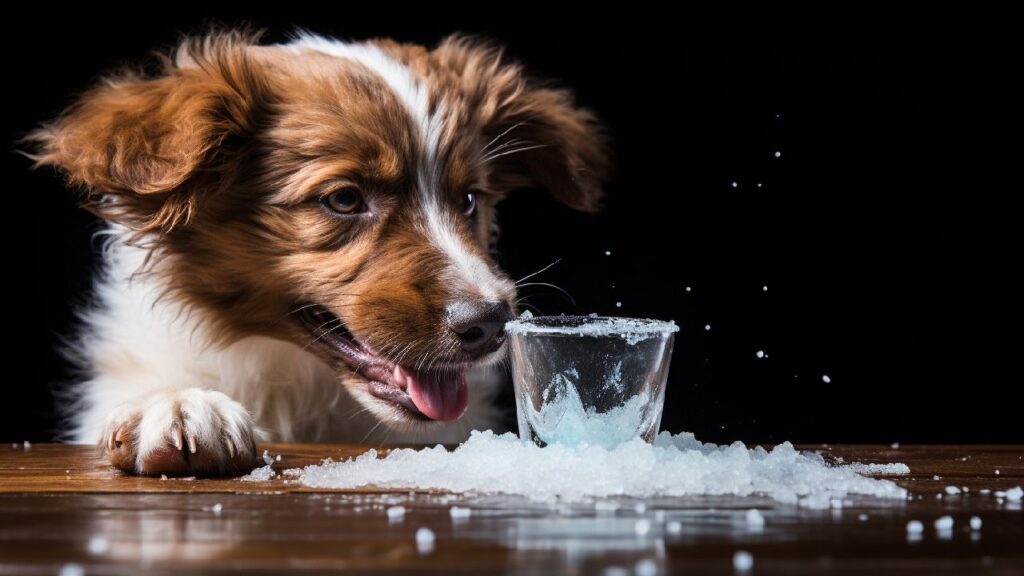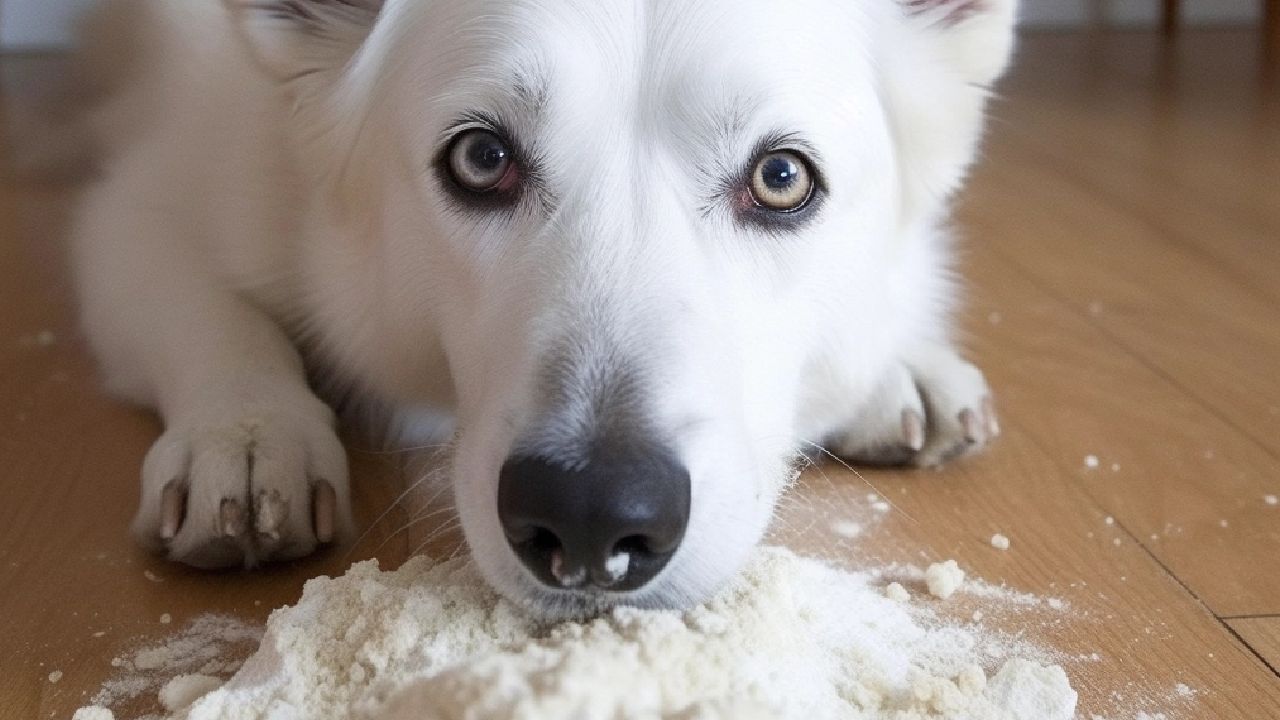Dogs can consume small amounts of salt without immediate harm, as their bodies require sodium for proper bodily functions. However, excessive salt intake can lead to serious health issues such as salt poisoning or hypernatremia, which can cause symptoms ranging from increased thirst and urination to vomiting, seizures, and even death in severe cases.
Is Salt Bad for Dogs?
Salt can indeed be harmful to dogs if consumed in excessive amounts. While sodium is a necessary electrolyte that supports various bodily functions, including nerve and muscle activity, too much can lead to imbalances that risk your dog’s health.
Excessive salt intake can strain your dog’s kidneys as they work to filter out the excess sodium from their system. This can disrupt their electrolyte balance, lead to dehydration, high blood pressure, and even damage vital organs.
Salt poisoning, or hypernatremia, is a genuine concern for dogs. When dogs ingest too much salt, their bodies struggle to process it efficiently.
This can result in symptoms such as excessive thirst, increased urination, diarrhea, vomiting, lethargy, tremors, seizures, and severe cases of coma or death. Thus, it’s crucial to be cautious about the amount of salt your dog consumes and to prioritize their overall health by avoiding high-sodium foods and treats.

How Do Dogs Consume Too Much Salt?
Dogs can unintentionally consume excessive salt through various avenues, often without their owners realizing it. One common way is indulging in salty human foods, such as chips, pretzels, or even leftover scraps seasoned heavily. These treats may seem harmless in moderation, but sodium can quickly add up in a dog’s relatively smaller body.
Commercial pet foods and treats can also contribute to elevated sodium levels. Some dog foods contain hidden salts as preservatives or flavor enhancers. Regularly feeding your dog these products might lead to an accumulation of sodium in their diet over time, potentially surpassing their recommended intake.
Another unsuspecting source is salt water. If your dog enjoys a dip in the ocean or swims in a pool, they might ingest saltwater while playing or drinking.
Ingesting significant amounts of saltwater can lead to sodium imbalances, dehydration, and various health complications.
Symptoms of Salt Poisoning
Salt poisoning, also known as hypernatremia, can have many distressing symptoms for dogs. If your dog has consumed an excessive amount of salt, you might observe the following:
- Excessive Thirst: One of the initial signs of salt poisoning is an unquenchable thirst. Your dog might constantly seek out water and drink significantly more than usual.
- Increased Urination: Excessive salt intake can lead to increased urine production. If you notice that your dog needs to go outside frequently to urinate, it could be a sign of sodium imbalance.
- Vomiting and Diarrhea: Digestive disturbances such as vomiting and diarrhea can occur. These symptoms can lead to dehydration, exacerbating the effects of salt poisoning.
- Lethargy and Weakness: Dogs with salt poisoning might appear unusually lethargic, weak, or fatigued. They may need more energy and enthusiasm.
- Tremors and Seizures: In severe cases, dogs might experience tremors or seizures. These neurological symptoms are concerning and require immediate veterinary attention.
- Confusion or Disorientation: Excess sodium levels can impact your dog’s brain function, leading to confusion, disorientation, and an altered mental state.
- Swelling and Fluid Retention: High sodium levels can lead to fluid retention and swelling, particularly around the extremities or abdomen.
- Coma or Death: If salt poisoning is left untreated, it can progress to more severe stages, potentially resulting in coma or even death.
If you observe any of these symptoms in your dog and suspect salt poisoning, immediate veterinary care is crucial. Swift action can prevent complications and improve the chances of a positive outcome.
Remember, even a tiny amount of sodium can harm your furry friend, so prevention and awareness are vital.

Should Your Dog Avoid Salty Foods?
Expert Comment – Dr. Sarah Martinez, Veterinarian: Given the potential risks associated with excessive salt consumption, limiting your dog’s intake of salty foods is a wise choice. While sodium is necessary for your dog’s bodily functions, an excess can disrupt their electrolyte balance and strain their kidneys.
This could lead to long-term health issues that are best avoided. As a veterinarian, I recommend choosing specially formulated dog treats and foods designed to meet your pet’s nutritional needs without exposing them to unnecessary sodium levels.
Prioritizing your furry friend’s well-being through a balanced diet is crucial to responsible pet ownership. By making informed dietary decisions, you can help ensure your dog maintains optimal health and lives a happy, active life.
Conclusion
A pinch of salt may not immediately threaten your dog, but it’s essential to prioritize their overall health and well-being. Keep an eye on their diet, avoid offering them salty human treats, and opt for veterinarian-approved snacks and foods that cater to their nutritional requirements. Remember, a healthy and happy pooch enjoys a balanced and nourishing diet without excessive salt.

FAQs
Are there any safe human foods with a bit of salt that dogs can enjoy?
Plain-cooked meats without added salt can be a safe occasional treat for dogs, but keeping the portions small is essential.
Can I share my salty snacks with my dog in moderation?
It’s better to avoid sharing salty human snacks with your dog. Even small amounts can contribute to excessive sodium intake over time.
What should I do if I suspect my dog has consumed too much salt?
Contact your veterinarian immediately if you notice symptoms like excessive thirst, vomiting, or tremors.
Are there any health benefits to saltwater swims for dogs?
Saltwater swims can be refreshing for dogs, but be cautious. Drinking large amounts of salt water can lead to sodium imbalances, so providing fresh water after swimming is essential.
Can homemade dog food be a better option to control salt intake?
Yes, preparing homemade dog food gives you better control over ingredients. Consult your vet to ensure your recipes meet your dog’s nutritional needs.






I had no idea about the salt thing! Our lab love salty treats